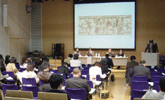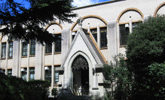Project outline / Plan / Research groups
An outline of the research project
Comparative Genocide Studies( CGS ) - ügThe Development of Genocide Researchüh is one of the core research projects in the Japan Society for the Promotion of Science's üg New Research Initiatives in Humanities and Social Sciences : Area ćU , Advanced Study for Building Peaceüh.
The aim of this research is to establish and reposition üggenocide researchüh, currently grouped in an unexplored area of the humanities and social sciences in Japan , and to make even a slight contribution to ügthe construction of peaceüh. Genocide is still now taking place in various regions all over the world. This research project represents an attempt to establish a theoretical framework for comparative genocide research, based on concrete empirical evidence, and to work towards theories of prevention.
The object of study for this project will be broad: the many different instances of genocide which have taken place all over the world throughout the twentieth century. Firstly, we will reposition the massacres which took place during World War Two, generally accepted and understood as the ügHolocaustüh, as ügEuropean genocideüh, and approach it from a variety of points of view: racism and eugenics; ethnic self-determinism and forced migration; acts of war and acts of extermination; and critical approaches to the modern nationalist state. Alongside this, we will examine the Armenian massacres in Turkey during World War One; genocide which occurred in developing countries such as Cambodia, Rwanda and Guatemala; and genocide in the former Yugoslavia; analyzing the background to and contributing causes of each, as well as their processes and consequences, all the while highlighting the universality and present-day relevance of the issue of genocide.
Further, we will examine genocide occurring under colonial rule or under conduct of war (including sexual violence and ügcultural genocideüh), and genocide under socialist dictatorships as occurred in the former Soviet Republic and China, to empirically demonstrate the various forms and mechanisms of genocide. Focus will also be placed upon the ability of genocide to fundamentally alter the structure of regional societies, and upon issues such as the reconstruction of and reconciliation within post-genocide afflicted societies, as well as memories and trauma of the victims and their representation. In this way, while this project will use modern German and European history as its starting point, its scope far exceeds this sector, and represents an endeavour to identify the intrinsic qualities of modern-day genocide.
For each individual topic of research, the methods employed will largely be those of the academic disciplines of history and area studies, but on the theoretical front we intend to develop a greater elaboration of the notions of ügstructured violenceüh, ügcultural violenceüh and üghuman securityüh which have been key concepts in sociology in recent years. This project will extend across several academic disciplines and remove barriers between specialties. In concrete terms, the project will chiefly be undertaken by young researchers and those of middle standing who have striven to overcome boundaries between disciplines and who have held an interest in the significance of genocide to such diverse academic fields as history, area studies, medical history, cultural anthropology, international law, international politics, peace studies and philosophy.



